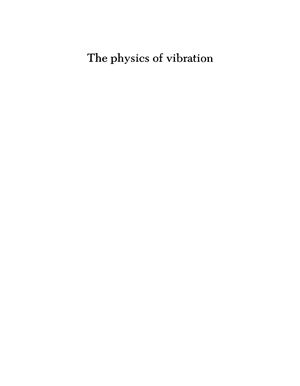Cambridge University Press, 2007. 656 p. ISBN:0521033330,
0521372003
The study of vibration in physical systems is central to almost all fields in physics and engineering. This work, originally published in two volumes, examines the classical aspects in Part I and the quantum oscillator in Part II. The classical linear vibrator is treated first and the underlying unity of all linear oscillations in electrical, mechanical and acoustic systems is emphasized. The treatment of nonlinear vibrations, a field with which engineers and physicists are generally less familiar, is then examined. Part II then concentrates on quantum systems, looking at the vibrations in atoms and molecules and their interaction with electromagnetic radiation. The similarities of classical and quantum methods are stressed and the limits of the classical treatment are examined. Throughout the book, each phenomenon discussed is well illustrated with many examples; and theory and experiment are compared. This is a useful introduction to the more advanced mathematical treatment of vibrations as it bridges the gap between the basic principles and more specialized concepts.
The study of vibration in physical systems is central to almost all fields in physics and engineering. This work, originally published in two volumes, examines the classical aspects in Part I and the quantum oscillator in Part II. The classical linear vibrator is treated first and the underlying unity of all linear oscillations in electrical, mechanical and acoustic systems is emphasized. The treatment of nonlinear vibrations, a field with which engineers and physicists are generally less familiar, is then examined. Part II then concentrates on quantum systems, looking at the vibrations in atoms and molecules and their interaction with electromagnetic radiation. The similarities of classical and quantum methods are stressed and the limits of the classical treatment are examined. Throughout the book, each phenomenon discussed is well illustrated with many examples; and theory and experiment are compared. This is a useful introduction to the more advanced mathematical treatment of vibrations as it bridges the gap between the basic principles and more specialized concepts.

